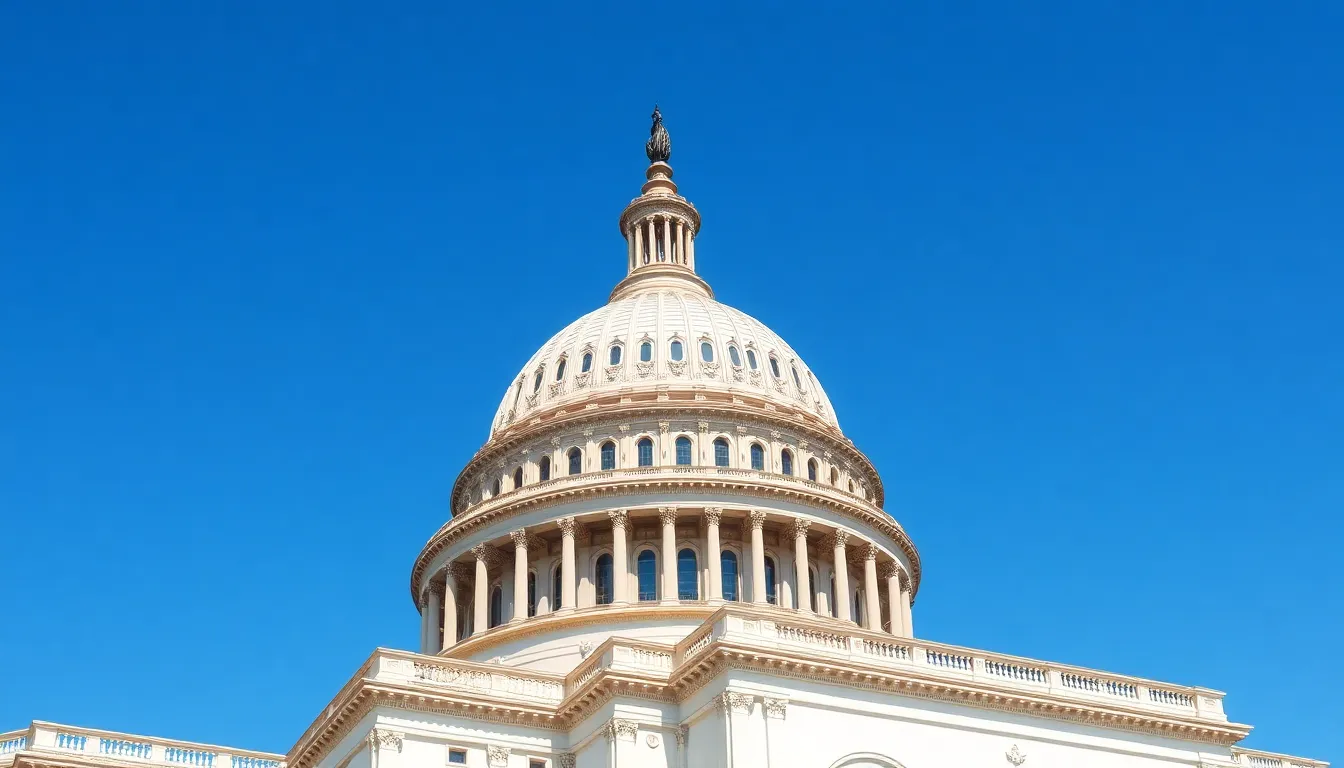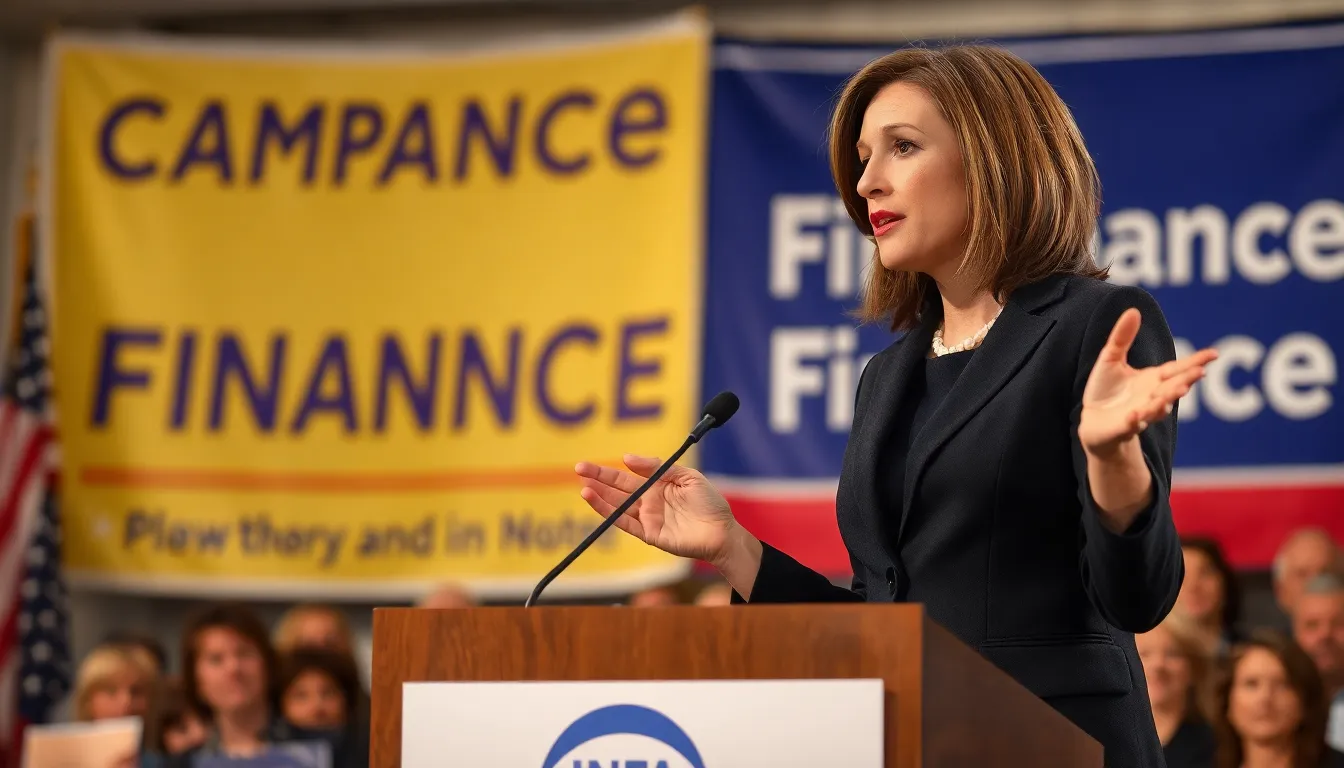In the world of politics, money plays a crucial role in shaping campaigns and influencing elections. Campaign finance laws exist to regulate the flow of funds into political campaigns, ensuring transparency and fairness. These laws aim to level the playing field, allowing candidates to compete on a more equal footing regardless of their financial backing.
Understanding campaign finance laws is essential for voters who want to grasp the dynamics of political influence. With the rise of super PACs and dark money, the landscape has become increasingly complex. This article delves into the intricacies of these laws, exploring their history, current regulations, and the ongoing debates surrounding their effectiveness in promoting democratic integrity.
Table of Contents
ToggleOverview of Campaign Finance Laws
Campaign finance laws govern the funding of political campaigns and outline how candidates raise and spend money during elections. These laws aim to promote transparency, reduce corruption, and ensure a fair playing field for candidates.
Key Components
- Contribution Limits: Campaign finance laws establish limits on the amount individuals and organizations can contribute to candidates. For example, the Federal Election Commission (FEC) caps individual contributions at $2,900 per election.
- Disclosure Requirements: Candidates must disclose their financial contributions and expenditures. This transparency allows voters to see who funds campaigns, helping mitigate the influence of special interests.
- Political Action Committees (PACs): PACs play a crucial role in campaign finance. They collect contributions and donate to candidates or parties. The laws distinguish between traditional PACs, which must adhere to contribution limits, and Super PACs, which can raise unlimited funds but cannot coordinate directly with candidates.
- Public Financing: Some jurisdictions offer public financing options for candidates who agree to limit their spending. This approach aims to level the playing field, enabling candidates with less personal wealth to compete effectively.
Recent Developments
In recent years, campaign finance laws have evolved due to landmark Supreme Court decisions like Citizens United v. FEC. This ruling allowed for greater independent expenditures by corporations and unions, leading to an influx of “dark money” in elections—funds from undisclosed sources that bypass traditional limits and disclosure.
Ongoing Challenges
Campaign finance laws face scrutiny and debate regarding their effectiveness in maintaining electoral integrity. Critics argue that current regulations fail to curb the influence of wealthy donors and special interest groups, while proponents defend them as essential for promoting democracy.
Understanding campaign finance laws is crucial for informed voting. Voters must navigate the complexities of funding sources, contributions, and the implications of recent legal changes to grasp fully how money influences political dynamics.
Historical Context

Understanding the historical context of campaign finance laws reveals their evolution and the key legislative milestones that have shaped today’s political landscape.
Evolution of Campaign Finance Regulations
Campaign finance regulations have evolved significantly over the past century. Early efforts to regulate campaign contributions emerged in the 1900s, aiming to curb corruption and increase transparency in political funding. The Federal Corrupt Practices Act of 1925 established the first federal restrictions on contributions and expenditures. Subsequent amendments introduced limits on campaign financing.
In the aftermath of Watergate, Congress passed the Federal Election Campaign Act (FECA) in 1971, which set specific limits on individual contributions and required public disclosure of campaign finances. The 1974 amendments further strengthened these regulations by creating the Federal Election Commission (FEC) to enforce compliance.
By the 1990s, the influence of large donations and the need for reform prompted further legislative efforts. The Bipartisan Campaign Reform Act of 2002 aimed to restrict soft money contributions to political parties, addressing concerns about unlimited funding sources. However, the introduction of super PACs and the Supreme Court’s 2010 Citizens United decision significantly altered the regulatory landscape, allowing for unlimited independent expenditures.
Key Legislation Milestones
Several key pieces of legislation significantly impacted campaign finance:
| Year | Legislation | Description |
|---|---|---|
| 1925 | Federal Corrupt Practices Act | Established early restrictions on contributions and expenditures. |
| 1971 | Federal Election Campaign Act (FECA) | Introduced limits on contributions and disclosure requirements. |
| 1974 | FECA Amendments | Created the Federal Election Commission for enforcement. |
| 2002 | Bipartisan Campaign Reform Act | Restricted soft money contributions to political parties. |
| 2010 | Citizens United v. FEC | Allowed unlimited independent expenditures from corporations and groups. |
These milestones reflect ongoing efforts to balance political financing with transparency and fairness. Each legislative change responded to the ever-evolving dynamics of campaign funding and the need for regulation in an increasingly complex political environment.
Current Framework
Campaign finance laws consist of a combination of federal and state regulations designed to govern the funding of political campaigns. This framework aims to promote transparency and limit corruption in the electoral process.
Federal Laws Governing Campaign Finance
Federal laws establish fundamental regulations on campaign financing. The Federal Election Commission (FEC) oversees these laws, which include:
- Contribution Limits: Individuals face restrictions on the amount they can donate to candidates, political parties, and PACs. For instance, contributions are capped at $2,900 per candidate per election cycle.
- Disclosure Requirements: Candidates and committees must report contributions and expenditures, ensuring public access to financial information.
- Political Action Committees (PACs): Federal laws permit the formation of PACs, enabling organizations to raise and spend money to influence elections while adhering to specific contribution limits.
- Public Financing: Candidates may opt for public financing options if they agree to abide by spending limits, primarily available during presidential elections.
The 2010 Supreme Court ruling in Citizens United v. FEC allowed corporations and unions to make unlimited independent expenditures, significantly affecting the campaign finance landscape by facilitating the rise of super PACs and dark money.
State-Level Regulations
States enforce their own campaign finance laws, tailored to their political contexts. Common features include:
- Contribution Limits: Varying from state to state, many set lower limits compared to federal regulations, reflecting local priorities.
- Disclosure Obligations: States require timely reporting of campaign contributions and spending, ensuring public information reflects state electoral activities.
- State-Specific PACs: Some states allow for unique PAC structures or limitations, influencing how local elections are funded and conducted.
- Public Funding Options: Certain states provide public financing programs for qualifying candidates, promoting competitive electoral environments.
Variances among state regulations create a complex framework, necessitating awareness for individuals engaging in political contributions at various levels.
Impact on Elections
Campaign finance laws significantly shape election outcomes by influencing political campaigns and voter engagement. Their design aims to ensure transparency and level the competitive field.
Influence on Political Campaigns
Campaign finance laws directly affect candidates’ abilities to raise and spend money on their campaigns. These laws impose contribution limits on individuals and organizations, which can restrict the funding available for candidates. For instance, as of 2023, individual contributions are limited to $2,900 per election cycle for federal candidates. This limitation encourages a broader base of support rather than reliance on a few large donors.
PACs and super PACs play crucial roles in campaign financing. Super PACs, which can support a candidate without limits on expenditures, often create significant funding disparities. The landmark Citizens United v. FEC decision led to a surge in independent spending by these entities, allowing parties and candidates to access unprecedented resources for voter outreach and advertising. This influx can skew election dynamics, where candidates with more substantial financial backing can dominate airwaves and campaign visibility.
Effects on Voter Participation
Campaign finance laws also influence voter participation levels. High spending by well-funded candidates can lead to voter disenchantment, particularly among those who lack financial backing. A perception that elections favor wealthier candidates may discourage grassroots support and engagement, as voters feel their contributions matter less in a landscape dominated by big money.
Conversely, transparency in campaign financing aims to empower voters by providing insight into funding sources. Disclosure requirements mandate that candidates report financial contributions and expenditures, promoting an informed electorate. When voters understand who funds candidates, they can make educated decisions, enhancing democratic participation.
Efforts to include public financing options, such as matching funds for small donations, encourage broader participation from various socioeconomic groups. This approach could cultivate a more diverse candidate pool, reflecting a wider array of voter interests and leading to enhanced civic engagement.
Contemporary Issues
Contemporary issues in campaign finance laws revolve around legal challenges and the implications of super PACs and dark money on the electoral landscape.
Recent Legal Challenges
Recent legal challenges to campaign finance laws highlight ongoing tensions between regulation and free speech. Courts continue to address claims that strict financing laws infringe on political expression. Significant cases since Citizens United v. FEC have raised questions about the constitutionality of contribution limits and disclosure mandates. For instance, cases like McCutcheon v. FEC in 2014 invalidated aggregate contribution limits, allowing individuals to contribute more across multiple candidates. Legal debates also focus on the effectiveness of transparency regulations meant to combat corruption, with critics arguing that loopholes undermine these laws. This ongoing litigation shapes the evolution of campaign finance, complicating the regulatory landscape for candidates and voters.
The Role of Super PACs and Dark Money
Super PACs and dark money play a pivotal role in modern campaign finance, significantly impacting election outcomes. Super PACs facilitate unlimited independent expenditures, allowing them to finance advertisements and other activities supporting or opposing candidates. The influence of super PACs has led to shifts in campaign dynamics, where wealthier entities can disproportionately affect races. Dark money, often funneled through nonprofits not required to disclose donors, further obscures funding sources. Estimates suggest that in the 2020 election cycle, dark money groups spent over $600 million, raising concerns about accountability and informed voter choices. This unchecked financial power can distort democratic processes, prompting calls for greater transparency and reform in campaign finance laws.
Campaign finance laws play a crucial role in shaping the electoral landscape. As the influence of money in politics continues to grow, understanding these regulations becomes essential for voters. Transparency and fairness remain at the forefront of discussions surrounding campaign financing.
With ongoing legal challenges and evolving dynamics, the need for reform is evident. Voters must stay informed about the implications of funding sources and the impact of recent court decisions. Engaging with the complexities of campaign finance not only empowers individuals but also strengthens the democratic process. A well-informed electorate is vital for ensuring that political representation reflects the interests of all citizens, not just those with deep pockets.



